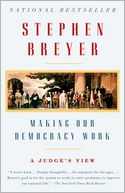 I believe Stephen Breyer's Making Our Democracy Work is the last lingering book that I got from our library's Tempt-Me shelf last year, before the big ban of the Double Dare. I liked reading about how one of our Supreme Court Justices thinks the Court should work. He starts with a background of what the court is and the history of some major cases, but the main thesis of the book is how the courts work with the other sections of government in a pragmatic way. Pragmatism is one of his key philosophies as a judge, preferable to other baselines such as original intent.
I believe Stephen Breyer's Making Our Democracy Work is the last lingering book that I got from our library's Tempt-Me shelf last year, before the big ban of the Double Dare. I liked reading about how one of our Supreme Court Justices thinks the Court should work. He starts with a background of what the court is and the history of some major cases, but the main thesis of the book is how the courts work with the other sections of government in a pragmatic way. Pragmatism is one of his key philosophies as a judge, preferable to other baselines such as original intent.Breyer's view is that in general, courts should look at the presumed intent of Congress when interpreting a law, and apply that to vague or confusing passages.
In this way, voters can use the actual results of a law to decide if they like the way their legislatures are performing. He gives examples both historical and modern, and uses cases where he ended up on both the dissenting side and the winning side to show the practical effects of various decisions. He looks particularly hard at some of the worst cases to see how and why the Court went wrong, and what were the effects on its usefulness and public confidence (Dred Scott, Cherokee Trail of Tears, Japanese interment in WWII). I fell he does a decent job of avoiding personal politics and presenting facts and effects of various judgements. It's a readable look at our modern court, finishing with some of the post-9/11 decisions about the limits of habeus corpus.
He doesn't completely convince me about pragmatism; he seems to feel any time the court makes a decision that doesn't work out it has failed. I think that sometimes that just echoes the fact that some laws are failures; the court interpreting them in a way that makes them work jumps boundaries.
2 comments:
I actually got this book for free when I attended a CLE (continuing legal education) seminar given by Justice Breyer! Sadly I haven't had time to read it yet. But I was very impressed with his lecture at the CLE, which basically was a condensed version/highlights of the book.
That sounds like a great seminar program. You can probably skim the first section of the book, where he explains how the courts are organized, so it's even shorter than it looks.
Post a Comment